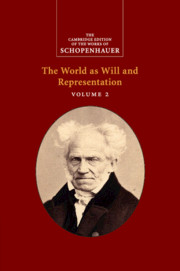Chapter 49 - The Way to Salvation
Published online by Cambridge University Press: 30 June 2022
Summary
There is only one innate error, and it is that we exist to be happy. It is innate in us because it coincides with our existence itself, and our whole being is really only a paraphrase of it, indeed our body is its monogram: we are in fact nothing but will to life, and what we think of under the concept of happiness is the successive satisfaction of all our willing.
As long as we persist in this innate error, and even find corroboration for it in optimistic dogmas, the world seems full of contradictions. For with every step, in matters both large and small, we must discover that the world and life are in no way constituted to contain a happy existence. While thoughtless people feel plagued only by what actually happens, anyone who thinks has, in addition to the pain of reality, the theoretical perplexity of why a world and a life that exist only for people to be happy fail so miserably to live up to this goal? This perplexity is expressed in deep sighs and pious exclamations such as: ‘Oh, why are there so many tears beneath the moon?’b and similar such things, but they are followed by disquieting scruples as to the assumptions made by those preconceived optimistic dogmas. People can always try to shift the guilt for their individual unhappiness, now on to circumstances, now on to other people, and now on to their own bad luck or botched efforts, and probably have a good idea of how these have worked together to produce this effect; but this does not change the result, that they have missed the supposed true aim of life, which is supposedly to be happy; and these thoughts are often very depressing, particularly when life is in decline – this is why almost all elderly faces bear the expression of what the English term disappointment. And besides, every day of our lives to this point has taught us that even when we attain joys and pleasures, they are inherently deceptive and do not provide what they promise, do not put the heart at ease, and that in the end their possession is soured, even if just by the annoyances that accompany them or arise from them; while on the other hand pains and sufferings prove very real and often exceed all expectations.
- Type
- Chapter
- Information
- Schopenhauer: The World as Will and Representation , pp. 650 - 656Publisher: Cambridge University PressPrint publication year: 2018

